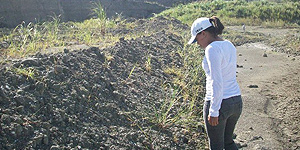By Monica Shippritt
My name is Monica Shippritt and I am 19 years old. My dream of becoming a biologist was born when I was 16 years old. I loved watching documentaries on television about research and from there my interest in biology began to grow. To me, the most interesting aspect of biology is that we can understand the behavior of living organisms. I also like that it helps us discover things that have never been discovered before.
I am currently studying biology at the University of Panama. I never thought my path as a biologist would start this fast, but only in the first semester of my career, I was given the opportunity to participate as a volunteer in a large research center in Panama, “Smithsonian”.

I started in June 2010 after being invited by Catalina Pimiento, a doctoral student from the University of Florida doing research in paleontology at the Smithsonian. This opportunity provides many advantages for my career because I can start developing paleontology-related skills. This will help me to start being involved in paleontology at Panama, and to build a critical attitude towards scientific issues.
I currently assist Catalina with her investigation of fossil sharksfrom Panama. The work I do varies; for example, I do screen washing, which involves washing sediment collected in the field and leave it as clean as possible, to then make picking, which consists in finding and selecting shark teeth (or other fossils) in the sample previously washed.
I think that in order to work as a volunteer in the PIRE, you need to have good attitude and desire rather than special skills. Personally, being a good observer helps because that way I can easily find shark teeth not only in the laboratory doing picking, but also in the field. At first I learned some techniques, and over time I’ve learned new ones and improved I what already knew.
What excites me most about the work in paleontology is to find organisms that existed millions of years ago and that many people are unaware of. As a volunteer in the PIRE, I have learned many things that help me in my career, not only about the work I do on paleontology, but also about other research being conducted in Smithsonian, which I find very interesting.
As a young scientist, I am very grateful for this opportunity. I feel that all this time I have been doing this work I have grown up as a scientist.
Por Mónica Shippritt
Mi nombre es Mónica Shippritt, tengo 19 años. Mi sueño de ser bióloga nace cuando tenía 16 años de edad. Me gustaba ver documentales en la televisión sobre investigaciones biológicas y desde ahí mi interés en esta ciencia empezó a crecer. Para mí, lo más interesante de la biología, es que nos permite conocer el comportamiento de los seres vivos, y nos ayuda a descubrir cosas que nunca antes se habian descubierto.
Estudio actualmente Biología en la Universidad de Panamá; nunca pensé que mi camino como bióloga comenzara tan rápido, pero tan sólo en el primer semestre de mi carrera se me presentó la oportunidad de participar como voluntaria en un gran Centro de Investigaciones en Panamá: “el Smithsonian”.

Empecé en junio de 2010, luego de haber sido invitada por Catalina Pimiento, quién es una estudiante de doctorado de la Universidad de la Florida que realiza trabajos de investigación en paleontología en el Smithsonian. Esta oportunidad representa muchas ventajas para mi carrera como bióloga, ya que de esta manera me puedo desenvolver desde muy temprano en temas relacionados con la paleontología. Esto me servirá para participar en actividades profesionales en Panamá e ir desarrollando una actitud crítica en cuanto a temas científicos.
Actualmente trabajo asistiendo en la investigación de Catalina sobre tiburones fósiles de Panamá. El trabajo que realizo es variado, por ejemplo, hago screenwashing, lo cual consiste en lavar el sedimento colectado en el campo hasta dejarlo lo más limpio posible, para luego hacer picking, que consiste en buscar y separar los dientes de tiburón (u otros fósiles) en la muestra previamente lavada.
Pienso que para trabajar como voluntaria en el PIRE, no se necesita contar con habilidades especiales, más bien es cuestión de actitud y ganas. En lo personal me ha ayudado mucho ser buena observadora, pues de esta forma he podido encontrar fácilmente los dientes de tiburón no solo en el laboratorio haciendo picking, sino también en el campo. Al principio aprendí algunas técnicas, y al pasar el tiempo he aprendido nuevas o he mejorado las que ya sabía.
Lo que más me emociona del trabajo en paleontología, es descubrir organismos que existieron hace millones de años y que mucha gente desconoce. Como voluntaria en el PIRE, he aprendido muchísimas cosas que me ayudarán en mi carrera, no solo acerca del trabajo que realizo sino también de otras investigaciones que se realizan en este laboratorio, lo cual encuentro muy interesante.
Como joven, me siento muy agradecida por esta gran oportunidad. Siento que todo este tiempo que llevo realizando esta tarea me ha servido mucho para madurar científicamente.